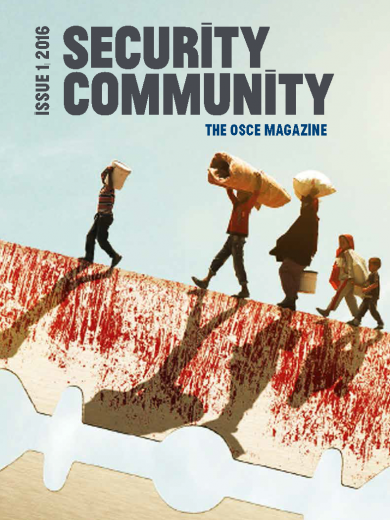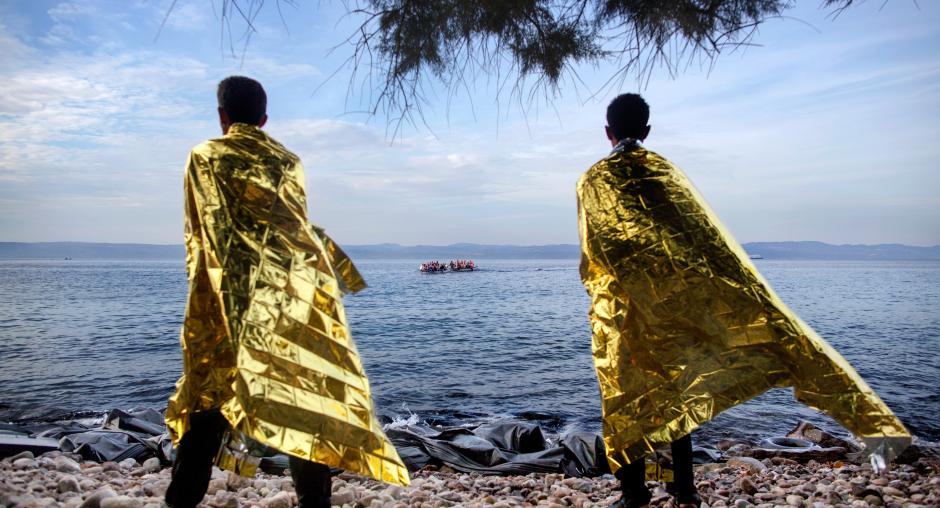Migration: A Moral Opportunity
By Peter D. Sutherland
Our collective efforts to manage large migration flows have largely failed, says Peter Sutherland, the United Nations Secretary General’s Special Representative for International Migration. Ahead of the United Nations Summit on Refugees and Migrants in September, the international system has the opportunity to recognize what has gone wrong and how it must be fixed.
Every so often a macabre headline captures our attention and awakens our conscience. Consider the devastating image of Aylan Kurdi, the Syrian toddler who washed up dead on a Turkish beach last summer, or the eight hundred souls who perished on a single weekend last April when their boat sunk tragically in the Mediterranean. As these headlines fade in a toxic haze of resurgent nationalism and tribal instinct, it is our duty to hold strong on the moral responsibility of the world’s leaders. The consequences of a renewed and aggressive nationalism are damaging for all.
Refugees seeking safe haven from violent conflict – the first victims of terrorism – are particularly vulnerable. They arrive often to face razor wire fences and can remain stranded in terrible conditions for prolonged periods. Those who find themselves detained are thus faced with two options: either recoil back into the hands of their smugglers in a desperate attempt to find safe passage around borders or continue existing in a state of limbo. “Existing” entails surviving in evergrowing and often unsanitary camps. This situation is morally unfathomable and unacceptable in a civilized world. Behind all of this is a fear spreading across Europe and over the Atlantic that outsiders might in some way compromise traditions and values.
In fact, in some countries, fuelled by the tropes of nationalism, citizens and their leaders are doing this themselves. Far-right parties are making de facto political gains and nationalist protesters are putting European values to the test – values that were given expression so nobly following World War II: tolerance, plurality and non-discrimination. Such an attack on the European project will abet authoritarian governments and usher in a culture characteristic of Huntington’s dystopian clash of civilizations wherein xenophobia prevails and the innocent are persecuted. All this while Europe again becomes divided (and not just through the manifestation of re-imposed physical borders). Similar forces of nationalism and nativism appear to be influencing the debate in the United States with Donald Trump, as a forerunner in the presidential race, proposing a ban on Muslims entering the country.
Between the outright hostility towards taking refugees in some countries, and a much more welcoming stance in others, collective efforts to manage large migration flows have largely failed. A global crisis demands an urgent global response with strong leadership. Over the course of this year the international system has an opportunity to recognize what has gone wrong and how it must be fixed. World leaders must accept their responsibility by the time they convene at the United Nations Summit on Addressing Large Movements of Refugees and Migrants in September.
First it must be accepted that this is not a problem that will dissipate or a crisis that can be averted to other shores, as some leaders would appear to prefer to assume. We must look to the future with tenacious realism. Migration is a global reality that will continue unabated. Almost 60 million people currently live displaced, 20 million as refugees needing sanctuary, according to the United Nations High Commissioner on Refugees (UNHCR) Global Trends Report1 released in June last year; countless more risk displacement with more conflict and disasters on the horizon.
Our capacity to protect must grow also to embrace not only those strictly defined as refugees. Consider children exploited for labour, or communities at risk from the unevenly distributed burdens of climate change. In Bangladesh alone, a typhoon in the Bay of Bengal could forcibly displace millions who reside in low-lying coastal areas.This demands a global response capacity and a long-term approach.
Secondly, we need specific improvements to the international protection system so that the international community is not responding merely on an ad hoc basis. This requires, inter alia, an acceptance that proximity does not define responsibility. Rhetorical responses need to be translated into concrete deliverables that uphold international law. These have to be both transparent and verifiable.This means assessing and defining what it costs to support forced migrants and the front-line states who host them. This will only work as part of a long-term humanitarian plan requiring an expansion in both financial aid and resettlement capacities at each respective national level, globally. It is not an either-or scenario.
As the high-level UNHCR conference on pathways for admission for Syrian refugees in Geneva on 30 March showed – with few states announcing any new plans to take in refugees –, there is a markedly uneven effort to host the displaced. Many wealthy countries fall short on resettlement pledges. It is unfathomable that 86 percent of refugees reside in developing countries,as documented in the above-mentioned UNHCR report. Jordan, Lebanon, and Turkey host almost 4.5 million refugees from Syria alone, according to research by Human Rights First. In the absence of adequate responsibility-sharing, this has led to deteriorating conditions in, and access to, frontline countries. We live in a world interconnected and ineluctably integrated, and this must be reflected through a collaborative and shared policy on migration.
At the same time, the international community must work collaboratively to generate safe and legal pathways for refugees, creating a balance against our absolute objection to irregular and illegal movements of migrants. With criminal smuggling enterprises in Europe estimated by Europol in its February report “Migrant Smuggling in the EU” to have reaped between three and six billion Euros in 2015 alone, we need to provide alternative channels, so that desperate people are not forced to make the perilous journey across the Mediterranean and through hazardous terrain. Regular channels should be created to integrate migrants and refugees in society as active members. Humanitarian visa schemes should be implemented, private sponsorship should be coordinated and scholarships should be granted.
Brazil’s humanitarian visa programme for Haitians, as facilitated by the International Organization for Migration, can be seen as a model for how legal pathways can be operationalized. Canada’s 38-year-old “Private Sponsorship of Refugees” programme is another model for good practice. This programme co-ordinates organizations and groups of regular Canadians to privately sponsor refugees during their first year of settlement, and now takes charge of resettling about 40 per cent of the country’s displaced arrivals. This private sponsorship process has become a global model, with some refugee advocates in the United States wanting to replicate it, which should be encouraged.
We must also remember that, according to UN figures, more than 41 per cent of the world’s refugees are children, and about 36 per cent of those risking the treacherous journey between Greece and Turkey are also children, as reported by UNICEF. Often these children spend undefined periods of time held in detention without recourse to judicial review. As well as guaranteeing family reunification, we must ensure that a child’s mental and physical well-being is regarded as a top priority with an absolute ban on the detention of children. This must be set as protocol for the future, by which the world is legally bound.
Finally, we must also help the world rethink the very idea of what our duties to refugees and vulnerable migrants actually are. The international community is in need of a reformed narrative, which can respond to the changing nature of migration. Rather than seeing refugees as a security threat to be averted, we must demonstrate that they can be positive contributing members of society, and integrated into communities, markets and schools. The international community must not succumb to the barbaric fears of far-right nationalists, but must use this moment as an opportunity to improve the conditions of countless lives today, and many more yet to come.
Peter D. Sutherland is the United Nations Special Representative of the Secretary-General for International Migration.
Welcome to Security Community
Security Community is the OSCE’s online space for expert analysis and personal perspectives on security issues.
The views expressed in the articles are those of the authors and do not necessarily reflect the official position of the OSCE and its participating States.


